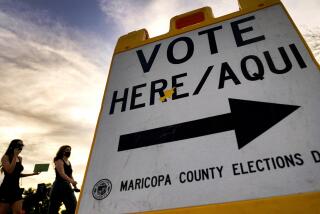Arizona’s election law is best left alone
The Supreme Court seems poised to overturn a modest effort by the state of Arizona to increase the candidate choices placed before voters and reduce the corruption associated with large special-interest campaign contributions. The conservative justices who were skeptical of the law and its rationale at Monday’s oral arguments should think again. Upholding the law would not violate their convictions about campaign finance.
The Arizona law provides a lump sum to candidates who agree to accept public financing and to abide by restrictions on fundraising and limits on how much they can give to their own campaigns. That amount is increased, however, when an opponent who doesn’t accept public financing — or independent groups supporting that candidate — spend beyond a certain amount.
The conservative justices are deeply wedded to the idea that campaign spending is a form of free speech. With that in mind, those who challenged the law made two 1st Amendment arguments. One was that the additional payments for participating candidates chill the speech of candidates who don’t accept public financing, because they will be less likely to spend private funds for fear that their opponents will receive matching funds. The other was that privately financed candidates are forced to subsidize messages they disagree with because by spending on their own campaigns they trigger payments for their opponents.
Neither of these arguments withstands scrutiny. Far from chilling speech, the Arizona law increases it. As Justice Elena Kagan put it: “There is no restriction at all. It’s more speech all the way around.” In a recent op-ed article in The Times, Costas Panagopoulos of Fordham University presented empirical evidence that privately financed candidates didn’t spend less because of the matching system. As for the notion that candidates who spend private funds are subsidizing their publicly financed opponents, the increased funds come from the state, not from the candidate.
Another concern of the conservative justices is that an election law not try to “level the playing field” by equalizing resources between candidates. The only justification they accept for campaign-finance regulations is to avoid the reality or appearance of corruption. But Arizona offers an anti-corruption rationale for its law, which was enacted after a major scandal tied to political contributions.
Campaign finance issues have produced polarized positions on the court; witness the decision in the Citizens United case. But the concerns of the conservative majority — that the Arizona law inhibits political speech and that it aims to level the playing field — are groundless. The court can, and should, uphold the law without revisiting larger issues about the role of money in politics.
More to Read
A cure for the common opinion
Get thought-provoking perspectives with our weekly newsletter.
You may occasionally receive promotional content from the Los Angeles Times.










